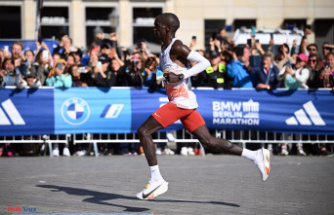South Africa has hosted two football World Cups. That of FIFA in 2010, and that of “mamie football” in March 2023. Shakira did not come to sing Waka Waka during this international tournament for grandmothers, but local artists set the mood. And the two events are linked, since it was in 2010, during the World Cup, that foreign journalists became interested in the senior club of a certain “Mama Beka” and made it known to the rest of the world.
The report is broadcast on televisions in Massachusetts, in the United States, where Jean Duffy, a 64-year-old amateur footballer, and her teammates instantly feel “connected to these inspiring women” aged 40 to 80. Impressed, the sixty-year-old sportswoman contacted Mama Beka and became friends with this figure from Nkowankowa, a rural township in the northeast of South Africa.
In Limpopo province, everyone knows Rebecca Beka Ntsanwisi, known as “Mama Beka”, a former presenter on public radio SABC, also called “Mother Teresa” for her philanthropic activities. The story of the “soccer granny” in South Africa dates back to the mid-2000s, when she took up walking on the advice of her doctor to face colon cancer. Women recognize her and join her. The lack of physical activity of these women, often placed under house arrest to take care of the home, accentuates their suffering.
“Grandmothers almost all have the same problems: pain in their hips, shoulders and legs, high blood pressure, diabetes, stress. And many of them experience depression because of a difficult life, confides Mama Beka. I remember a woman who lost four of her children to AIDS and had to take care of her grandchildren even though she didn't have enough money. »
“The team provides emotional support”
One day, after walking together, these women rest under a tree. Kids are playing football on the field opposite. A balloon strays alongside them, like a revelation. “One of the grandmothers starts running to shoot the ball but misses, runs again and misses again, tries for the umpteenth time and misses the ball again. The kids were hilarious! They ran towards us to get the ball and ended up passing with the grandmothers,” says Mama Beka.
The next day, one of the grandmothers calls her to tell her all the good this game has done her. She slept like a baby and wants to do it again. Rumor is circulating that Mama Beka is starting a football team. “There were ten of us the next day,” she remembers. People recognized me, they shouted my name, it was gaining momentum. » Five days later, there were 80 of them playing football and the Vakhegula Vakhegula club (“the grannies”, in the Tsonga language) was born in 2007. Today, the boss says there are 200 “granny football” teams in South Africa.
“Football means so many things to them,” says Jean Duffy, who wrote a book about this story, Soccer Grannies. “The team offers emotional support, it allows them to face the ups and downs of life together,” summarizes the athlete, who participated in the final of the Grannies’ World Cup. A French team, Footeuses à tout ages, also took part in the tournament. But for Marie-France Gosselet, the president of the club, the important thing “is not the spirit of competition but the well-being of women, as Beka initially wanted.”
“They are the heroines of the village.”
“Grandma football” is helping to change society’s view of old age. “We are not curious animals,” confirms Marie-France Gosselet, who sees mentalities evolving. The stands at the Nkowankowa stadium were filled with young people who came to support their elders. “It’s a source of motivation for younger people like me. If they can do it, why can’t we? », rejoiced Tsakani Shihundla, a spectator met on site. “There are grandmothers who run faster than you! Come on, you won’t be able to follow them,” Mama Beka teases us over the phone.
But today, it’s after sponsors that she’s chasing. “My challenge was to help the African teams financially. They didn't have a cent, I had to pay for their transport, take care of accommodation,” she recalls. Initially invited, the teams from Togo, Guinea, Lesotho, Zambia or Malawi were unable to make the trip. Her Grannies' World Cup put her in debt, she still owes money to partners and is looking for funding to travel to France in June 2024 and publicize her competition. This will return to Nkowankowa, promises Mama Beka. Target: 2025.
“There should be granny football clubs all over the world,” enthuses Jean Duffy, who supports the organization of a new tournament: “It was an extraordinary experience to see so many people honoring and respecting women elderly people playing football. This shows to what extent Beka and her teams have made things happen. Before, they were told to stay at home to take care of the grandchildren. Now they are the heroines of the village. » “Maradona! », “Mbappé! », “Messi! » From the stands, the public had fun renaming the footballers with anonymized jerseys. They were no longer grannies, they were stars.












